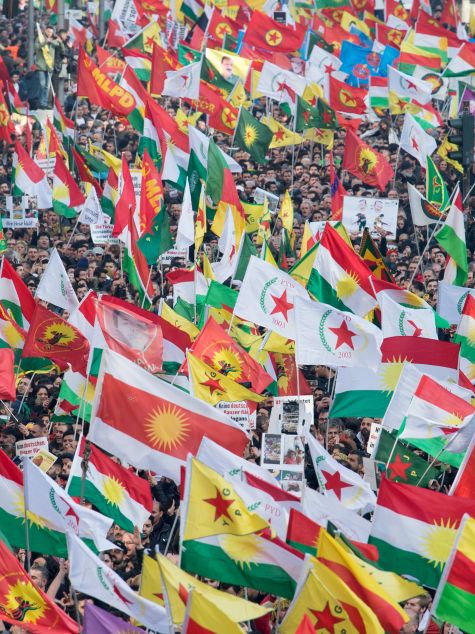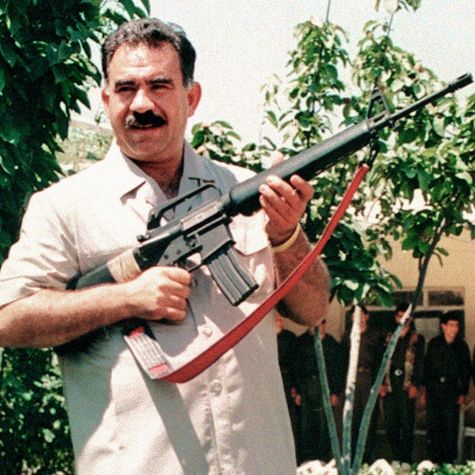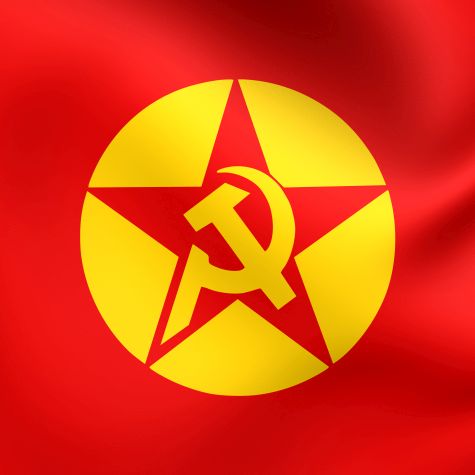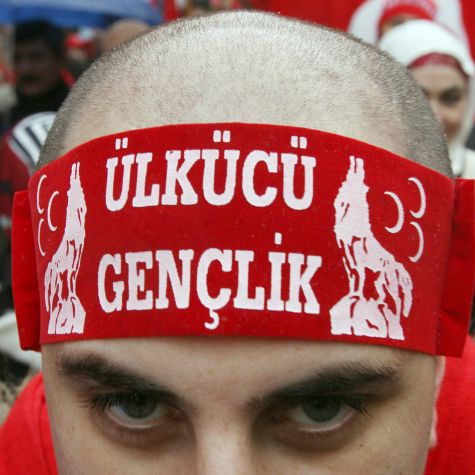Foreign extremism

In the field of non-Islamist foreign extremism, groups with different interests exist that cooperate with one another or with German extremist groups only in specific cases or situations. Ideological elements range from right-wing to left-wing extremism, and there are also organisations that pursue separatist goals in their home countries. It thus is not a uniform spectrum in which alliances form rather easily, but a conglomerate of groups with different interests that cooperate with one another or with German left-wing extremist groups only in specific situations.
The policy, strategy and activities pursued by the organisations active in Germany are mainly determined by the situation in their countries of origin and by the instructions issued by the central organisational units there. What they all have in common is that they strive for a fundamental change in the political circumstances in their home countries and that they usually have no compunction about using violence or even terrorist means to achieve this aim.
The foreign extremist organisations acting from within Germany thereby not only oppose the concept of international understanding, but they may also put German internal security at risk.
Kurdistan Workers’ Party (PKK)

In Germany PKK has been subject to a ban on its activities since 1993. Furthermore, since 2002, it has been on the EU list of terrorist organisations.
The main demands of PKK include the acknowledgement of the Kurdish identity and the Kurds’ political and cultural autonomy in their settlement areas in Turkey and in Syria.
Despite the ban, PKK still is the most efficient extremist organisation of foreigners in Germany. It is able to mobilise individuals far beyond the circle of its own followers. Moreover, its structures allow a quick implementation of new strategic and tactical guidelines, which may also include the revival of militant forms of action.
In the Kurdish settlement areas in Turkey and in northern Iraq, PKK has guerrilla units called the People’s Defence Forces (HPG). Both in southern Turkey and in the Kurdish settlement areas in northern Syria and northern Iraq, hostilities have repeatedly broken out between PKK guerrilla units and the Turkish military. This military conflict has been characterised and aggravated by attacks committed by PKK.
The activities undertaken by PKK followers in Germany are chiefly determined by the following factors:
- The ongoing military clashes with Turkish security forces in the home region,
- concern for the health and prison conditions of PKK founder Abdullah Öcalan, detained on the Turkish prison island of İmralı,
- the measures taken by the Turkish government against PKK and its associated organisations and political parties.
Critical developments and incidents in the Kurdish settlement areas in Turkey, northern Syria or northern Iraq always have a direct impact on the activities undertaken by PKK followers and thus on the security situation in Germany. If military clashes break out between Turkish security forces and PKK in the home region, tensions between the followers of the opposing political camps increase in Germany too.
Events held in Europe mostly pass off without any incidents, but according to PKK’s ideology, violence remains an option. This becomes obvious not least because PKK recruits individuals in Germany for its guerrilla units. Given that the situation in the Kurdish settlement areas continues to be tense, PKK still makes every effort to enlist individuals from Germany in the organisation’s guerrilla units. PKK’s youth organisation in particular has a major part in the recruitment activities in Germany and in Europe.
Turkish left-wing extremist organisations
The shared goal of Turkish left-wing extremists is to destabilise and ultimately overcome the social order in Turkey and the country’s political leadership. This is why their agitation mainly targets the Turkish state and constitutional system as well as the government, which they describe as an “oligarchy”.

The following left-wing extremist Turkish groups are most relevant in Germany:
- the Turkish Communist Party / Marxists-Leninists (TKP/ML),
- the Revolutionary People’s Liberation Party-Front (DHKP-C) and
- the Marxist-Leninist Communist Party (MLKP).
The Revolutionary People’s Liberation Party-Front (DHKP-C) is the most important organisation of the Turkish left-wing extremist spectrum. It advocates a revolutionary destruction of the existing state and social order in Turkey and aims at establishing a socialist society.
DHKP-C considers Turkey, referred to as “fascist” and “oligarchic”, and the USA its principal enemies. The organisation asserts that Turkey is dominated by “US imperialism” in political, economic and especially military terms. The organisation has claimed responsibility for a large number of terrorist attacks in Turkey carried out against members and premises of security and judicial authorities.
Having been banned in Germany in 1998, DHKP-C uses cover names to conduct its politico-propagandist activities in our country. For instance, it operates under the name of People’s Front (Halk Cephesi) or under the name of its youth organisation Devrimci Gençlik (Dev Genç). Several local DHKP-C associations also use the name of People’s Council (Halk Meclis).
Militant actions and attacks carried out by DHKP-C in Turkey meet with a great response among its followers in Germany, and the organisation considers them an important means to strengthen cohesion and motivation. While DHKP-C sees Germany as a “safe haven”, the events it organises to commemorate its “martyrs” show that its Germany-based adherents, too, support the party line, including the terrorist option. The emphasis placed on the “revolution martyrs” as role models indicates that DHKP-C regards Germany and Europe as a base for the recruitment of new cadres and potential attackers.
One of the organisation’s most significant propaganda instruments is the music band Grup Yorum. The concerts organised by DHKP-C and its supporters, including those held in Germany, serve to ensure the organisation’s funding and especially to spread its ideology. In this way, DHKP-C taps into a pool of potential supporters much larger than its own following.
Turkish right-wing extremism
Right-wing extremist organisations with a link to other countries are strongly marked by nationalism and regard their own ethnic group as more important than other ethnic groups. One of the key players in this field is the right-wing extremist Turkish Ülkücü movement, which emerged in Turkey in the mid-20th century. Its aim is to protect Turkishness and to establish “Turan”, a (fictitious) ethnically homogeneous state led by the Turks that covers the settlement areas of the Turkic peoples and that, depending on the ideological interpretation, stretches from the Balkans to western China or even to Japan.
The “grey wolf” symbol (“Bozkurt”) and the salutation derived from it (where individuals, with outstretched right arm, form a wolf's head with their thumb and fingers) are considered the signs of recognition of the Ülkücü movement’s followers, who are unofficially called “Grey Wolves” (“Bozkurtlar”).
The largest Ülkücü umbrella organisation in Germany is the Föderation der Türkisch-Demokratischen Idealistenvereine in Deutschland e. V. (ADÜTDF, Federation of the Turkish Democratic Idealists’ Associations in Germany). It is the German branch of the extremely nationalist Turkish Nationalist Movement Party (MHP), which is represented in the Turkish parliament. Organised in local associations, its members act as advocates and disseminators of right-wing extremist ideology. While ADÜTDF tries to outwardly appear as law-abiding, its activities are still characterised by extremism.
There are two more Ülkücü umbrella organisations besides ADÜTDF, both of which represent a part of the Ülkücü ideology that is more focused on Islam. In 1987 ATİB – Union der Türkisch-Islamischen Kulturvereine in Europa e.V. (ATİB, Union of Turkish-Islamic Cultural Associations in Europe) split from what is today ADÜTDF, without changing its ideological orientation though. The Föderation der Weltordnung in Europa (ANF, Federation of the World Order in Europe) is the European organisation of the extremely nationalist Turkish Great Unity Party (BBP) and was founded in Germany in 1994.
Beyond the part of the Ülkücü movement that is organised in associations, some or all elements of its ideology can also be found among the non-organised parts of the population of Turkish origin. Turkey is a central emotional reference point for nationalists and right-wing extremists of Turkish origin, which is why incidents in that country are in general likely to arouse the emotions of followers in Germany.
Separatist organisations
The goal pursued by separatist organisations is to split off a part of the territory of their home countries in order to create a new, independent state. In their home countries, they partly use terrorist means.
One such example are the separatist structures within the religious community of the Sikhs. The political aim of separatist Sikh organisations is to found a Sikh state called “Khalistan” (“land of the pure”), independent of India, in the territory of the Indian state of Punjab. To achieve this aim, they also carry out terrorist actions in India.
The followers of extremist Sikh groups have not conducted any terrorist activities in Germany. Still, their propaganda supports the separatist efforts in India pursued using terrorist means, and at political level, they stand up for “Khalistan activists” imprisoned in India.


